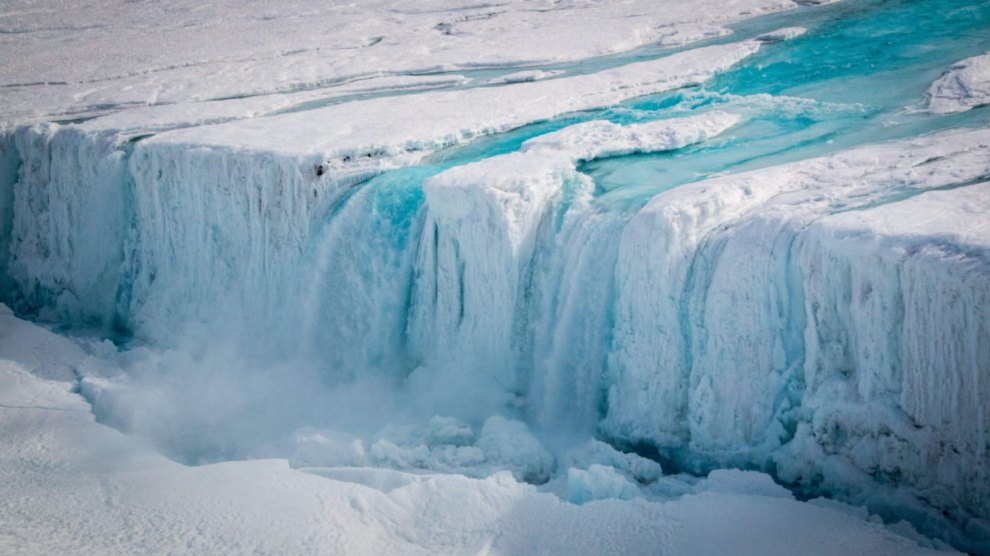
Peter Schaefer/Getty
This story was originally published by the Guardian and is reproduced here as part of the Climate Desk collaboration.
By the end of March, the surface temperature of the world’s oceans was above anything seen in the 40 years that satellites have been measuring it.
Records were “headed off the charts” and, as the heat refused to fade for more than a month, the Earth marched into “uncharted territory,” scientists said.
The temperature at the ocean’s surface—like on land—is being pushed higher by global heating but can jump around from one year to the next as weather systems come and go. But in the 2 kilometers below the surface, that variability is almost nowhere to be seen. The rising heat down there has been on a relentless climb for decades, thanks to burning fossil fuels.
“The heat-holding capacity of the ocean is mammoth,” says Paul Durack, a research scientist specializing in ocean measurements and modeling at the US Department of Energy’s Lawrence Livermore National Laboratory. “The ocean captures more than 90 percent of the imbalance of energy that we’re creating because of anthropogenic climate change.”
The ocean is much less reflective than the land and soaks up more of the direct energy from sunlight. But as greenhouse gases trap more of the energy that’s reflected back—allowing less to escape to space—the ocean tries to balance itself with the heat in the atmosphere above.
A technical chart in a chapter of the latest UN climate assessment laid out the unfathomable heat gain. Between 1971 and 2018, the ocean had gained 396 zettajoules (ZJ) of heat. How much heat is that? Scientists have calculated it is the equivalent energy of more than 25 billion Hiroshima atomic bombs—and that heat gain is accelerating.
A study in January found the ocean gained 10 ZJ more in 2022 than the year before—enough heat to boil 700 million tea kettles every second. Compared with the ocean, according to a study in January, the atmosphere has held on to about 2 percent of the extra heat caused by global heating since 2006.
To understand what’s happening below the ocean surface, out of sight of satellites, scientists look at a vast network of thousands of thermometers on buoys, ships, underwater gliders and permanent moorings.
Durack says it wasn’t until the early 2000s that a view of the changes in the ocean—long-predicted by climate scientists—started to become clear as more and more data became available. But scientists have been able to get a longer view going back many more decades by using climate models. “When we look at the climate models and compare them with the observations, we get consistent results across that simulated Earth and the real Earth. They’re all showing consistent warming.”
Bernadette Sloyan researches changes in the ocean at Australia’s CSIRO government science agency and spends her days analyzing ocean data. “This is where the ocean is like a flywheel that drives our climate and that’s all because of the amount of energy it takes to heat it up,” she says. “We have this constant talking between the ocean and the atmosphere that’s driving our weather and, annually, that’s our climate.”
Sloyan says the ocean has acted like the planet’s air conditioner, relentlessly absorbing extra heat. “But that air conditioner isn’t just passive. It is not a free service. Adding that heat has come with ocean acidification, rising sea levels and changes in the frequency of extreme weather.”
The effects of the extra heat are almost everywhere. As the ocean heats up, it expands, pushing up sea levels around the globe. Just over one-third of the rise in global sea levels is down to thermal expansion.
More heat means more marine heatwaves that have devastated marine ecosystems, causing bleaching on coral reefs and killing underwater plants that act like forests, providing habitats for marine life and acting as nurseries for fisheries.
Ocean heating could also radically alter marine food webs, with warmer conditions favoring smaller species and algae at the expense of the larger species that humans tend to eat.
In the deep ocean, where species have adapted to stable temperatures, scientists have said warming there in the coming decades could devastate marine life.
Around the tropics, where oceans are warmest, scientists have found species are already migrating towards the poles to find cooler waters. But with no other species able to take their place, this leaves behind waters stripped of marine life.
In places like the Mediterranean, where land blocks a route to cooler waters, Professor David Schoeman says many species will run out of ocean. “Fish can’t just climb out of the water so they may have to go deeper,” says Schoeman of the University of the Sunshine Coast in Australia, who helped coordinate the latest UN climate assessment’s work on the ocean.
But if species go deeper to survive the heat, this could present another problem. Schoeman says waters near the surface easily mix with the air above to provide enough oxygen for marine life. But as deeper waters warm they hold less oxygen, potentially cutting off another survival option for some species.
Schoeman says much of the heat that has pushed surface temperatures to new highs in recent weeks is likely coming from below. “Every year about 134 million atomic bombs of heat is being trapped by the ocean. It has kept global temperatures down and kept the land livable but we have to realize that energy hasn’t gone.”
The latest UN climate report says the warming of the ocean is likely to continue “until at least 2300” even if greenhouse gas emissions are low because of the “slow circulation of the deep ocean.”
Matthew England, an oceanographer and climate scientist at the University of New South Wales, is on a video call and shows an image of the globe taken over the Pacific, where almost no land is visible. “Remember the world is 70 percent covered by ocean. It should have been called Ocean, not Earth,” he says.
England says that simple physics means the ocean “has this huge ability to absorb heat and then hold on to it.” He holds his arms out wide to show the size of one cubic meter of air. To heat that air by 1C, he says, takes about 2,000 joules. But to warm a cubic meter of ocean needs about 4,200,000 joules.
“By absorbing all this heat, the ocean lulls people into a false sense of security that climate change is progressing slowly,” he says. “But there is a huge payback. It’s overwhelming when you start to go through all the negative impacts of a warming ocean.”
“There’s sea level rise, coastal inundation, increased floods and drought cycles, bleached corals, intensification of cyclones, ecological impacts, melting of ice at higher latitudes in the coastal margins—that gives us a double whammy on sea level rise.”
“The oceans have stored the problem,” says England. “But it’s coming back to bite us.”












